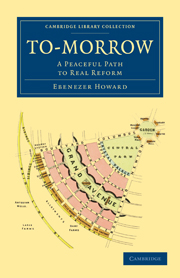Book contents
- Frontmatter
- Contents
- LIST OF ILLUSTRATIONS
- Introduction
- Chap. I The Town-Country Magnet
- Chap. II The Revenue of Garden City, and how it is obtained—The Agricultural Estate
- Chap. III The Revenue of Garden City—Town Estate
- Chap. IV The Revenue of Garden City—General Observations on its Expenditure
- Chap. V Further Details of Expenditure on Garden City
- Chap. VI Administration
- Chap. VII Semi-Municipal Enterprise—Local Option—Temperance Reform
- Chap. VIII Pro-Municipal Work
- Chap. IX Administration—A Bird's Eye View
- Chap. X Some Difficulties Considered
- Chap. XI A Unique Combination of Proposals
- Chap. XII The Path followed up
- Chap. XIII Social Cities
- Chap. XIV The Future of London
- APPENDIX: Water-Supply
- INDEX
- Plate section
- Frontmatter
- Contents
- LIST OF ILLUSTRATIONS
- Introduction
- Chap. I The Town-Country Magnet
- Chap. II The Revenue of Garden City, and how it is obtained—The Agricultural Estate
- Chap. III The Revenue of Garden City—Town Estate
- Chap. IV The Revenue of Garden City—General Observations on its Expenditure
- Chap. V Further Details of Expenditure on Garden City
- Chap. VI Administration
- Chap. VII Semi-Municipal Enterprise—Local Option—Temperance Reform
- Chap. VIII Pro-Municipal Work
- Chap. IX Administration—A Bird's Eye View
- Chap. X Some Difficulties Considered
- Chap. XI A Unique Combination of Proposals
- Chap. XII The Path followed up
- Chap. XIII Social Cities
- Chap. XIV The Future of London
- APPENDIX: Water-Supply
- INDEX
- Plate section
Summary
“New forces, new cravings, new aims, which had been silently gathering beneath the crust of re-action, burst suddenly into view.”
—Green's “Short History of the English People,” Chap. x.“Change is consummated in many cases after much argument and agitation, and men do not observe that almost everything has been silently effected by causes to which few people paid any heed. In one generation an institution is unassailable, in the next bold men may assail it, and in the third bold men defend it. At one time the most conclusive arguments are advanced against it in vain, if indeed they are allowed utterance at all. At another time the most childish sophistry is enough to secure its condemnation. In the first place, the institution, though probably indefensible by pure reason, was congruous with the conscious habits and modes of thought of the community. In the second these had changed from influences which the acutest analysis would probably fail to explain, and a breath sufficed to topple over the sapped structure.”
—The Times, 27th November, 1891.In these days of strong party feeling and of keenly-contested social and religious issues, it might perhaps be thought difficult to find a single question having a vital bearing upon national life and well-being on which all persons, no matter of what political party, or of what shade of sociological opinion, would be found to be fully and entirely agreed.
- Type
- Chapter
- Information
- To-morrowA Peaceful Path to Real Reform, pp. 1 - 11Publisher: Cambridge University PressPrint publication year: 2010First published in: 1898



